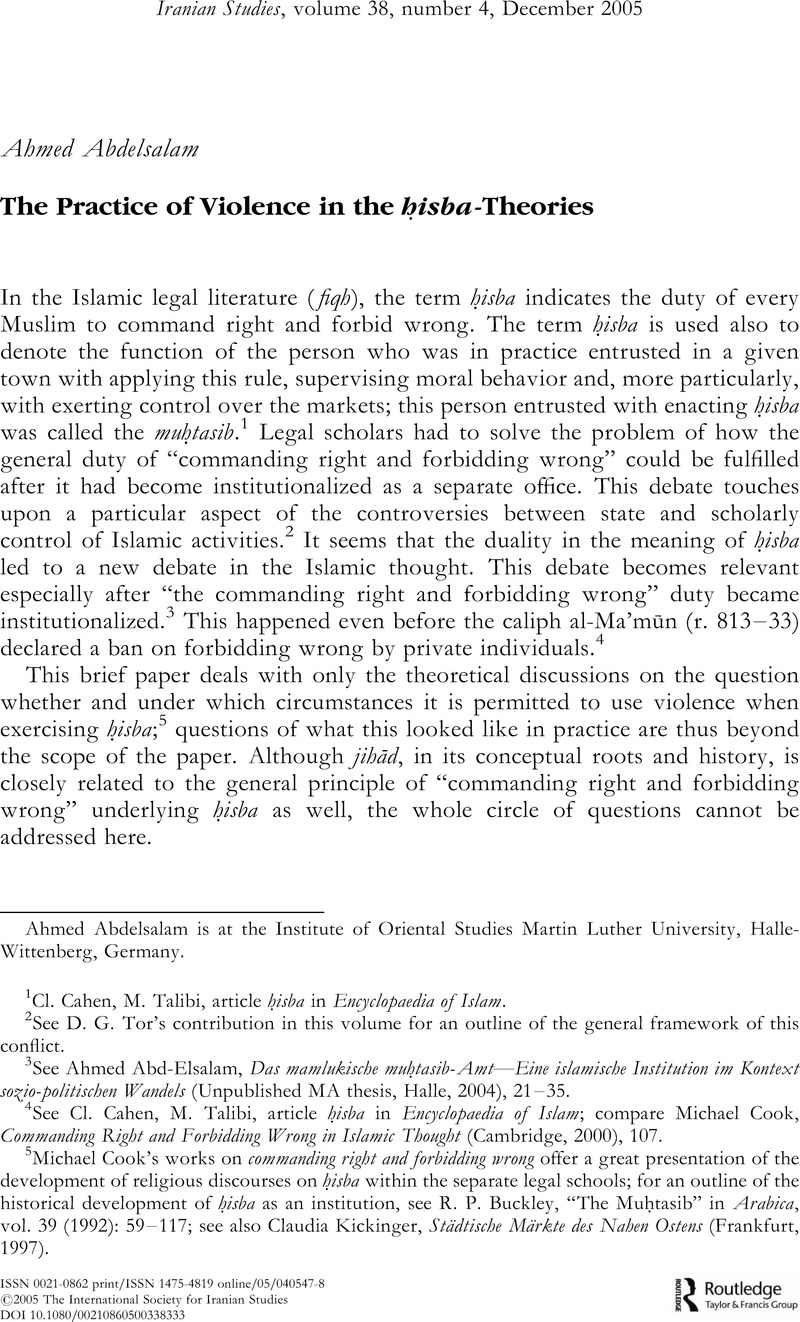Article contents
The Practice of Violence in the ḥisba-Theories
Published online by Cambridge University Press: 01 January 2022
Abstract

- Type
- Articles
- Information
- Copyright
- Copyright © 2005 The International Society for Iranian Studies
References
1 Cl. Cahen, M. Talibi, article ḥisba in Encyclopaedia of Islam.
2 See D. G. Tor's contribution in this volume for an outline of the general framework of this conflict.
3 See Abd-Elsalam, Ahmed, Das mamlukische muḥtasib-Amt—Eine islamische Institution im Kontext sozio-politischen Wandels (Unpublished MA thesis, Halle, 2004), 21–35Google Scholar.
4 See Cl. Cahen, M. Talibi, article ḥisba in Encyclopaedia of Islam; compare Cook, Michael, Commanding Right and Forbidding Wrong in Islamic Thought (Cambridge, 2000), 107Google Scholar.
5 Michael Cook's works on commanding right and forbidding wrong offer a great presentation of the development of religious discourses on ḥisba within the separate legal schools; for an outline of the historical development of ḥisba as an institution, see Buckley, R. P., “The Mutasib” in Arabica, vol. 39 (1992): 59–117CrossRefGoogle Scholar; see also Kickinger, Claudia, Städtische Märkte des Nahen Ostens (Frankfurt, 1997)Google Scholar.
6 Cook, Michael, Forbidding Wrong in Islam (Cambridge, 2003), 11CrossRefGoogle Scholar.
7 Cook, Michael, Forbidding Wrong in Islam (Cambridge, 2003), 27CrossRefGoogle Scholar ff.
8 Cook, Michael, Forbidding Wrong in Islam (Cambridge, 2003), 4CrossRefGoogle Scholar; and see Cook, Michael, Commanding Right and Forbidding Wrong in Islamic Thought (Cambridge, 2000), 34Google Scholar ff.
9 Cook, Michael, Forbidding Wrong in Islam (Cambridge, 2003), 4CrossRefGoogle Scholar.
10 For a detailed description, see Abd-Elsalam, Ahmed, Das mamlukische muḥtasib-Amt—Eine islamische Institution im Kontext sozio-politischen Wandels (Unpublished MA thesis, Halle, 2004), 11Google Scholar ff., 15 ff. and 67 ff.
11 See Imām, Muḥammad Kamāl al-Dīn, Uṣūl al-ḥisba fī al-islām (Alexandria, 1986), 54Google Scholar ff.
12 al-Dīn Imām, Muḥammad Kamāl, Uṣūl al-ḥisba fī al-islām (Alexandria, 1986), 49Google Scholar; see Muḥammad b. Hārūn al-Khallāl, Abū Bakr Aḥmad b., al-Amr bil-ma‘rūf wa-n-nahy ‘an al-munkar (Beirut, 1986), 38Google Scholar.
13 See al-Māwardī, Abū al-Ḥasan, al-Aḥkām al-sulṭāniyya (Beirut, 1992), 299Google Scholar ff.
14 al-Māwardī, Abū al-Ḥasan, al-Aḥkām al-sulṭāniyya (Beirut, 1992), 299Google Scholar ff.
15 See Abd-Elsalam, Ahmed, Das mamlukische muḥtasib-Amt—Eine islamische Institution im Kontext sozio-politischen Wandels (Unpublished MA thesis, Halle, 2004), 15–21Google Scholar.
16 See al-Ghazālī, Abū Ḥāmid, yā' ‘ulūm ad-dīn (Cairo, 1992), 2Google Scholar∶339–343.
17 See Taimiya, Aḥmad b., al-Ḥisba fī al-islām (Beirut, 1992), 10–24Google Scholar.
18 See Cook, Michael, Commanding Right and Forbidding Wrong in Islamic Thought (Cambridge, 2000), 202Google Scholar ff.
19 See Cook, Michael, Commanding Right and Forbidding Wrong in Islamic Thought (Cambridge, 2000), 352Google Scholar; see ‘Abd al-Salām, ‘Izz al-Dīn b., Qawā‘id al-aḥkām fī maṣālial-anām (Cairo, 1980), 1∶109Google Scholar.
20 See al-Dīn Imām, Muḥammad Kamāl, Uṣūl al-ḥisba fī al-islām (Alexandria, 1986), 49Google Scholar; see also Cook, Michael, Commanding Right and Forbidding Wrong in Islamic Thought (Cambridge, 2000), 202Google Scholar ff.
21 See al-Ghazālī, Abū Ḥāmid, yā' ‘ulūm al-dīn (Cairo, 1992), 2∶339–342Google Scholar. Fitna as a term denotes a wide variety of undesired situations, from private temptation via public disorder to full-fledged civil war.
22 See al-Māwardī, Abū al-Ḥasan, al-Aḥkā m al− sulṭāniyya (Beirut, 1992), 299–301Google Scholar.
23 Neither in the practice nor in the ḥisba manuals like those of Shaizarī and Ibn al-Ukhuwwa is there any attention paid to the limitation of the responsibilities of the muḥtasib to the ‘urf and the obvious and well-known religious regulations.
24 al-Māwardī, Abū al-Ḥasan, al-Aḥkām al-sulṭāniyya (Beirut, 1992), 300Google Scholar.
25 See Taimiya, Aḥmad b., al-Ḥisba fī al-islām (Beirut, 1992), 10Google Scholar.
26 See Taimiya, Aḥmad b., al-Ḥisba fī al-islām (Beirut, 1992), 25Google Scholar.
27 See Taimiya, Aḥmad b., al-Ḥisba fī al-islām (Beirut, 1992), 58–71Google Scholar.
28 See Taimiya, Aḥmad b., al-Ḥisba fī al-islām (Beirut, 1992), 70Google Scholar.
29 The source mentioned by Ibn Taimiya is unknown to me; see b. al-Farrā', Abū Ya‘lā, al-Aḥkām al-sulānīya (Cairo, 1966), 285Google Scholar.
30 See Taimiya, Aḥmad b., al-Ḥisba fī al-islām (Beirut, 1992), 70Google Scholar.
31 See Taimiya, Aḥmad b., al-Ḥisba fī al-islām (Beirut, 1992), 70Google Scholar ff.
32 See al-Ghazālī, Abū Ḥāmid, yā' ‘ulūm ad-dīn (Cairo, 1992), vol. 2∶343Google Scholar ff.; Cook, Michael, Forbidding Wrong in Islam (Cambridge, 2003), 27CrossRefGoogle Scholar ff.; ‘Abdallāh, ‘Abdallāh Muḥammad, Wilāyat al-ḥisba fī al-islām (Cairo, 1996), 143Google Scholar and 229 ff.
33 al- Juwainī, Abū al-Ma‘ālī, al-Irshād ilā qawāi‘al-adilla fī uṣūl al-i‘tiqād (Cairo, not specified): 368Google Scholar.
34 al-‘Uqbānī al-Tlimsānī al-Mālikī, Abū ‘Abdallāh b. Muḥammad, “Tuḥfat al-nāẓir wa-ghunyat al-dhākir fī ḥifẓ al-sha‘ā’ir”, in Bulletin d'Études Orientales, Institut Français de Damas, Tome XIX Années 1965–1966 (Damas, 1967): 6Google Scholar.
35 Taimiya, Aḥmad b., al-Ḥisba fī al-islām (Beirut, 1992), 63Google Scholar ff.
36 Taimiya, Aḥmad b., al-Ḥisba fī al-islām (Beirut, 1992), 63Google Scholar.
37 Taimiya, Aḥmad b., al-Ḥisba fī al-islām (Beirut, 1992), 63Google Scholar.
38 Taimiya, Aḥmad b., al-Ḥisba fī al-islām (Beirut, 1992), 62Google Scholar.
39 Taimiya, Aḥmad b., al-Ḥisba fī al-islām (Beirut, 1992), 10Google Scholar.
40 Shakir, M. H., Translation of the Holy Quran (online edition 1983), 2∶193; see also Aḥmad b. Taimiya, al-Fatāwā al-kubrā (Beirut, 1988), 4∶279–295Google Scholar.
41 See M. H. Shakir, Translation of the Holy Quran (online edition 1983), 4∶279–283 and 295–299.
42 Muḥammad b. Hārūn al-Khallāl, Abū Bakr Aḥmad b., al-Amr bi-l-ma‘rūf wa-n-nahy ‘an al-munkar (Beirut, 1986), 44Google Scholar.
43 Cook, Michael, Commanding Right and Forbidding Wrong in Islamic Thought (Cambridge, 2000), 101Google Scholar.
44 Cook, Michael, Commanding Right and Forbidding Wrong in Islamic Thought (Cambridge, 2000), 106Google Scholar.
45 See al-Ghazālī, Abū Ḥāmid, yā' ‘ulūm ad-dīn (Cairo, 1992), vol. 2∶343)Google Scholar; see al-Dīn Imām, Muḥammad Kamāl, Uṣūl al-ḥisba fī al-islām (Alexandria, 1986), 106Google Scholar ff.
46 al-Dīn Imām, Muḥammad Kamāl, Uṣūl al-ḥisba fī al-islām (Alexandria, 1986), 107Google Scholar.
- 1
- Cited by


